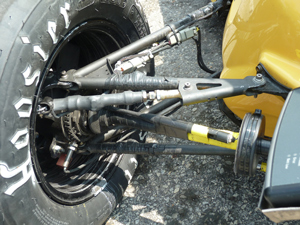- Scientific Data Driver Test
- Scientific Data Driver Updater
- Scientific Data Driver Jobs
- Scientific Data Disclosure
If you haven’t seen it already, the February 11 issue of Science magazine is worth a look. It contains a special section — titled “Dealing with Data” — that describes the challenges and opportunities arising from the wealth of scientific data being generated.
Scientific Data Driver Test
As the staff of Science writes in the overview piece:
If we can use and reuse scientific data better, the opportunities, as indicated in many examples in this special section, are myriad. Large integrated data sets can potentially provide a much deeper understanding of both nature and society and open up many new avenues of research. And they are critical for addressing key societal problems—from improving public health and managing natural resources intelligently to designing better cities and coping with climate change.

One reason is that data science is intricately intertwined with other important concepts also of growing importance, such as big data and data-driven decision making. Another reason is the natural.
To realize these opportunities, many of the articles in this collection speak of changing the culture of science and the practices of scientists, as well as recognizing the growing responsibility for much better data stewardship.
The perspectives in Dealing with Data cover a wide range of topics, including the climate, ecology, neuroscience, social science, global health, signal processing, and metaknowledge (i.e., about scientific discovery and innovation). All of these describe — directly or indirectly — the need for computational approaches such as data mining, machine learning, predictive modeling, etc.
There are also some interesting results from a poll of researchers who served as peer reviewers for Science in 2010. Of 1700 respondents:
- About 20% regularly use or analyze data sets exceeding 100 GB
- Nearly 40% don’t have the necessary expertise in their labs or groups to adequately analyze the data.
Check out the issue — available online — today.
(Contributed by Erwin Gianchandani, CCC Director)
Disclaimer: Posts on this blog report on happenings, opportunities, and issues that arise in the broad computing research community, and do not necessarily reflect the opinion of the CCC or the National Science Foundation.
If you haven’t seen it already, the February 11 issue of Science magazine is worth a look. It contains a special section — titled “Dealing with Data” — that describes the challenges and opportunities arising from the wealth of scientific data being generated.
As the staff of Science writes in the overview piece:
If we can use and reuse scientific data better, the opportunities, as indicated in many examples in this special section, are myriad. Large integrated data sets can potentially provide a much deeper understanding of both nature and society and open up many new avenues of research. And they are critical for addressing key societal problems—from improving public health and managing natural resources intelligently to designing better cities and coping with climate change.
To realize these opportunities, many of the articles in this collection speak of changing the culture of science and the practices of scientists, as well as recognizing the growing responsibility for much better data stewardship.
Needless to say- As a Data Scientist, I still like to play with my raw data with different approaches- Decision Trees, Classification algorithms etc. Key Driver Analysis is not about a single technique. If you are interested in knowing how PowerBI does this, here is the link I found. Pro Weather Range Support: WMR300 / WMR300A: WMR86 / WMR86A: WMR200 / WMR200A / WMRS200: User Manual FAQ Software: Use Manual FAQ: User Manual FAQ Software.
The perspectives in Dealing with Data cover a wide range of topics, including the climate, ecology, neuroscience, social science, global health, signal processing, and metaknowledge (i.e., about scientific discovery and innovation). All of these describe — directly or indirectly — the need for computational approaches such as data mining, machine learning, predictive modeling, etc.
There are also some interesting results from a poll of researchers who served as peer reviewers for Science in 2010. Of 1700 respondents:
- About 20% regularly use or analyze data sets exceeding 100 GB
- Nearly 40% don’t have the necessary expertise in their labs or groups to adequately analyze the data.
Check out the issue — available online — today.
Scientific Data Driver Updater
(Contributed by Erwin Gianchandani, CCC Director)
Scientific Data Driver Jobs
Disclaimer: Posts on this blog report on happenings, opportunities, and issues that arise in the broad computing research community, and do not necessarily reflect the opinion of the CCC or the National Science Foundation.
Scientific Data Disclosure
